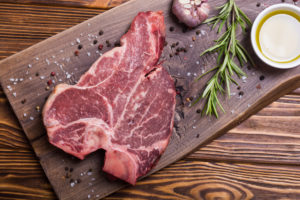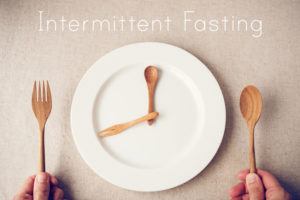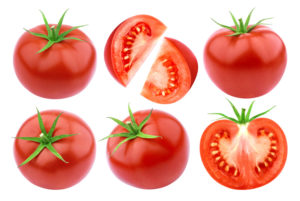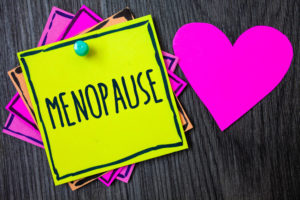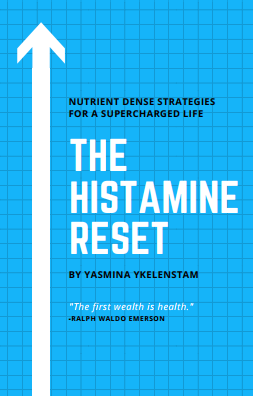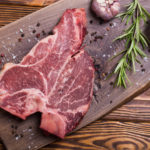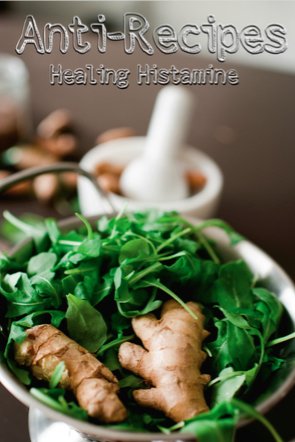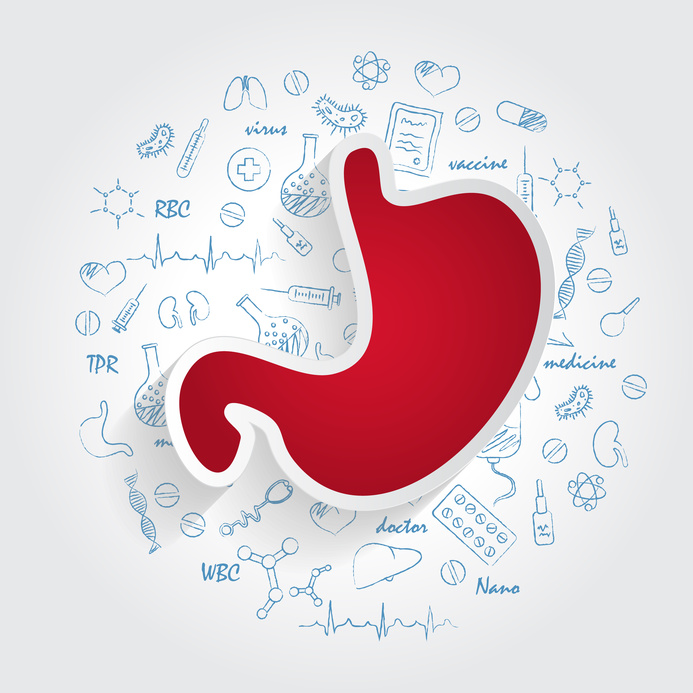
Histamine intolerance can bring with it plenty of digestive issues and diagnoses. Histamine can contribute to leaky gut as well as GERD, IBS, and Inflammatory Bowel Disease. While a change in diet is paramount, there are some other simple changes you can make to make eating enjoyable again. Here are a few tips for better digestion.
DON’T EAT WHEN STRESSED
This is probably one of the most important things you can do for histamine intolerance besides changing your diet and eliminating stress. The autonomic nervous system (ANS) is the body’s “automatic” side of the nervous system, as opposed to the somatic nervous system (SNS), which is what is activated when you consciously move your arms, legs, head, etc. There are two main states that your autonomic nervous system can be in: the sympathetic state and the parasympathetic state. The sympathetic state is known as the “fight or flight” mode and the parasympathetic state is known as the “Rest & Digest” mode.
When you are in “fight or flight” your body is in the stress state. This is not a good time to be eating and digesting foods, as your body is focused on producing stress hormones and not focused on digestion and repair. When the body is stressed, stomach acid secretion goes down, movement of food through the digestive system slows, the lining is more vulnerable (leaky gut), and there’s less blood flow to the gut. All of these changes lead to poor digestion of food and increased risk of health problems, like IBS, opportunistic infections, malabsorption, GERD, food intolerances, and autoimmune disease.
Mast cells are some of the main actors in the stress-gut connection. They respond to stress signals by calling for the release of all kinds of neurotransmitters and proinflammatory cytokines. This inflammatory response can actually injure the digestive system and cause all kinds of downstream effects.
INCLUDE ANTIHISTAMINE PREBIOTICS & COLONIC FOODS
There are a number of low histamine or antihistamine foods that have also been shown to help balance the microbiome/gut bacteria, promoting healthy digestion. Some of these foods include apple pectin, pomegranate husks, and green tea.
Apple pectin is not only antihistamine; it is also a colonic food — utilized by bacteroides, bifidobacteria, eubacteria, and clostridia.
Pomegranate husks — Increases bifidobacteria in the gut. Also decreases inflammation in the colon as well as throughout the entire body.
Green tea catechins. 300 mg green tea catechins or the equivalent of 5-6 cups of green tea per day increased lactobacilli and bifidobacteria, decreased numbers of bacteroides, clostridia, and enterobacteria, decreased fecal pH, decreased ammonia, and increased the production of short chain fatty acids, which nourish the brain.
SAVE CARBS FOR LATER
All carbs aren’t evil. Antioxidant-delivering, anti-inflammatory polyphenols and carotenoids are found in higher carbohydrate foods. Berries and black rice, squashes and sweet potatoes are all full of colorful nutrients that are extremely beneficial for the histamine intolerant person.
However, when a body is in an unstable condition, overreacting to harmless foods, scents, and other stimuli, there’s also a tendency for blood sugar to be unstable. That’s where carbs could be a problem. The up and down roller coaster of blood sugar imbalance can be both inflammatory and exhausting. Fortunately, there’s a simple solution: Save the carbs for later in the day. Eat your carbs with dinner, and instead of experiencing the ups and downs of blood sugar imbalance all day, you can just cause that spike once per day at dinnertime.
DON’T EAT AFTER 6/7 PM
Eating is a “Zeitgeber” — a time-giver– to the body. Your body adheres to a daily Circadian rhythm and there are certain daily activities that indicate to your body what time of the day it is. For instance, when your eyes are exposed to the blue/white light of the daytime hours (the sun), that is a zeitgeber that tells your body it’s daytime and it’s time to be active. Eating is another indicator that tells your body it’s time to be active. If you are planning to follow the daily rhythm of sleeping at night, eating is not a good thing to be doing as your body is supposed to be winding down. Eating is stimulating to the body, and stimulants are the last thing you want to reach for late in the evening.
Digestion also requires all kinds of energy and resources that tend to dwindle in the evening, allowing the body to rest. If you eat late in the evening, you are putting food in your body when your digestive capacity is at its lowest, and food doesn’t digest as it should. Additionally, studies have linked late night eating to diabetes, heart disease, GERD, and memory problems. Since inflammatory conditions, brain fog, and GERD are already issues for those with histamine intolerance, eating at night could just make things worse.
Stop eating by 6:00 or 7:00 pm, and you’ll improve both your digestion and your sleep.
——- REFERENCES ——-
EFSA ANS Panel (EFSA Panel on Food Additives and Nutrient Sources added to Food), Younes M, Aggett P, Aguilar F, Crebelli R, Dusemund B, Filipič M, Frutos MJ, Galtier P, Gott D, Gundert‐Remy U, Lambré C, Leblanc J‐C, Lillegaard IT, Moldeus P, Mortensen A, Oskarsson A, Stankovic I, Waalkens‐Berendsen I, Woutersen RA, Andrade RJ, Fortes C, Mosesso P, Restani P, Arcella D, Pizzo F, Smeraldi C and Wright M, 2018. Scientific Opinion on the safety of green tea catechins. EFSA Journal 2018;16(4):5239, 89 pp. https://doi.org/10.2903/j.efsa.2018.5239
Goto K, Kanaya S, Nishikawa T. The influence of tea catechins on faecal flora of elderly residents in long-term care facilities. Annals of Long-Term Care: Clinical Care and Aging. 1998;6:43–48.
Howell, A. B., & D’Souza, D. H. (2013). The Pomegranate: Effects on Bacteria and Viruses That Influence Human Health. Evidence-Based Complementary and Alternative Medicine : eCAM, 2013, 606212. http://doi.org/10.1155/2013/606212
Jiang, T., Gao, X., Wu, C., Tian, F., Lei, Q., Bi, J., … Wang, X. (2016). Apple-Derived Pectin Modulates Gut Microbiota, Improves Gut Barrier Function, and Attenuates Metabolic Endotoxemia in Rats with Diet-Induced Obesity. Nutrients, 8(3), 126. http://doi.org/10.3390/nu8030126
Konturek, P.C. Brzozowski,T., Konturek, S. J. (2011). Stress and the gut: pathophysiology, clinical consequences, diagnostic approach, and treatment options. Journal of Physiology and Pharmacology, 62(6), 591-599. Retrieved from: http://www.jpp.krakow.pl/journal/archive/12_11/pdf/591_12_11_article.pdf
Navigatore-Fonzo, L. S., Golini, R. L., Ponce, I. T., Delgado, S. M., Plateo, G., Gimenez, M. S., & Anzulovich, A. C. (2013). Retinoic acid receptors move in time to the clock in the hippocampus. Effect of a vitamin A-deficient diet. The Journal of Nutritional Biochemistry, 24(5), 859–867. http://doi.org/10.1016/j.jnutbio.2012.05.006
Taylor, P. W., Hamilton-Miller, J. M. T., & Stapleton, P. D. (2005). Antimicrobial properties of green tea catechins. Food Science and Technology Bulletin, 2, 71–81.
The Telegraph. (2017). Why you shouldn’t eat late at night, according to science. Retrieved from https://www.telegraph.co.uk/health-fitness/body/shouldnt-eat-late-night-according-science/


